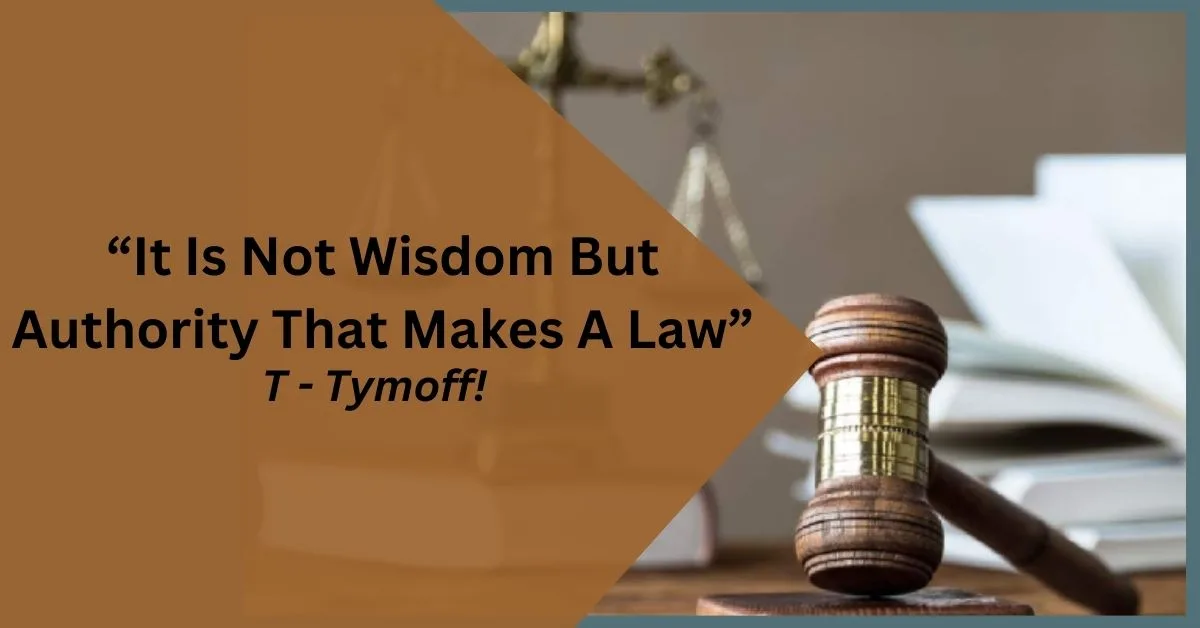Laws are an essential part of every society, providing structure and order. The statement “It is not wisdom but authority that makes a law” Tymoff” offers a thought-provoking view on the nature of law and governance. It suggests that laws are not necessarily created through wise or thoughtful consideration, but rather by those who hold power and authority.
In this article, we will explore the meaning behind this quote, its implications, and how it applies to modern legal systems. We will also examine the relationship between authority, wisdom, and law, and how these elements interact in shaping the rules that govern society.
Understanding the Meaning Behind the Quote
“It is not wisdom but authority that makes a law” highlights the difference between having power and using that power wisely. The statement suggests that laws are often created based on authority rather than the collective wisdom or benefit of society. Let’s break this down:
- Authority Over Wisdom: Authority refers to the power or right to make decisions, enforce obedience, and create laws. Wisdom, on the other hand, is the ability to make sound decisions based on knowledge, experience, and understanding. This quote implies that laws can be enacted by those in power, even if the laws are not the most well-considered or beneficial to the public.
- Power Dynamics: The quote underscores the role of authority in shaping the legal system. It points out that those in positions of power have the ability to create laws, regardless of whether their decisions are rooted in wisdom or not.

Historical Examples of Law Created by Authority
History is filled with examples where laws were created by those in authority, without regard for wisdom or fairness. Some key instances include:
Also visit true religion jeans
1. Absolute Monarchies
In many ancient kingdoms, laws were made solely by the monarch or ruler, regardless of their fairness or benefit to the people. These rulers often based their laws on personal interests, rather than the common good. Authority, rather than wisdom, was the driving force behind these laws.
2. Colonial Rule
During the era of colonialism, many laws were created by the colonial powers to control and exploit their colonies. These laws were not based on wisdom or fairness, but rather on the authority of the colonizers to maintain control over the people and resources of the colonized lands.
3. Dictatorships
In more recent history, dictators have created laws based on their authority, often disregarding the well-being of their citizens. Laws under dictatorship are often harsh and oppressive, driven by the desire to maintain power, rather than any sense of wisdom or justice.
The Role of Authority in Modern Legal Systems
In modern times, most legal systems have some checks and balances in place to ensure that laws are created through a combination of authority and wisdom. However, authority still plays a significant role in the creation and enforcement of laws.
1. Government and Lawmaking
In democratic systems, elected officials have the authority to create and pass laws. While these officials may rely on advisors, experts, and public opinion to guide their decisions, the final power to enact laws rests with those who hold authority. This can sometimes result in laws that reflect political agendas rather than the wisdom of what’s best for the society.
2. Judicial Systems
In many countries, the judicial system also has the authority to interpret laws and make legal decisions. However, judges may also be influenced by their authority rather than wisdom in some cases. Personal biases, political pressures, or lack of knowledge can affect legal rulings.
3. International Law
On an international level, powerful countries often have more influence in shaping global laws and regulations. This authority can sometimes lead to imbalances, where the needs and wisdom of smaller or less powerful nations are overlooked.
Must read st. louis cardinals standings
The Balance Between Authority and Wisdom in Lawmaking
Although authority plays a dominant role in lawmaking, wisdom should not be disregarded. A well-functioning society requires a balance between authority and wisdom when creating and enforcing laws. Here’s why:
1. The Importance of Wisdom
Wisdom is essential in lawmaking because it ensures that laws serve the greater good. Wise laws are based on knowledge, fairness, and long-term thinking, and they consider the well-being of society as a whole. When laws are created with wisdom, they are more likely to be just, effective, and respected by the people.
2. Potential Dangers of Authority Without Wisdom
When laws are created solely by authority without the input of wisdom, they can become unjust, oppressive, or impractical. Laws made in haste or out of self-interest can lead to social unrest, inequality, and long-term damage to the fabric of society.
3. Collaboration in Lawmaking
In modern democracies, there is often a collaboration between authority figures (politicians, government officials) and experts (legal scholars, economists, social scientists). This collaboration helps ensure that laws are not just made through authority but are also informed by wisdom.
Implications of Tymoff’s Quote in Today’s Society
The statement “It is not wisdom but authority that makes a law” raises important questions about the nature of law and governance in today’s society. In a world where authority often comes with political power, money, or influence, it is crucial to consider the following implications:
1. The Power of the People
In democratic societies, the people have the power to hold their leaders accountable. By voting for representatives who value wisdom and justice, citizens can influence the kind of laws that are created. Public activism, protests, and advocacy can also help ensure that authority is checked and that wisdom is considered in lawmaking.
2. The Role of Education
Education plays a key role in ensuring that both authority figures and the public are informed and knowledgeable about the laws that govern them. An educated population is better equipped to recognize when laws are made solely through authority without wisdom and can work to advocate for better, more just laws.
3. The Importance of Ethics in Law
Ethics should play a vital role in lawmaking. Laws that are created with ethical considerations are more likely to reflect wisdom and serve the greater good. When authority is exercised with an ethical framework in mind, laws are more likely to be fair, just, and respected by society.

Conclusion
The quote “It is not wisdom but authority that makes a law- Tymoff” serves as a powerful reminder of the relationship between power and lawmaking. While authority is necessary to create and enforce laws, wisdom must not be overlooked. A society governed by laws created through authority without wisdom risks becoming unjust and imbalanced. In contrast, a society that values both authority and wisdom in its legal system can thrive, ensuring justice and fairness for all.
FAQs
1. What does Tymoff’s quote mean?
Tymoff’s quote “It is not wisdom but authority that makes a law” suggests that laws are often created by those in power, regardless of whether they are wise or beneficial to society.
2. How does authority affect lawmaking?
Authority plays a dominant role in lawmaking because those in power have the ability to create, enforce, and interpret laws, often based on political agendas or personal interests.
3. Why is wisdom important in lawmaking?
Wisdom ensures that laws are fair, just, and serve the greater good. Laws based on wisdom take into account the long-term well-being of society.
4. Can authority and wisdom work together in lawmaking?
Yes, in many modern legal systems, authority and wisdom can work together through collaboration between elected officials and experts to create well-informed laws.
5. How can the public influence lawmaking?
In democratic societies, the public can influence lawmaking by voting for leaders who value wisdom, participating in public activism, and advocating for fair and just laws.
